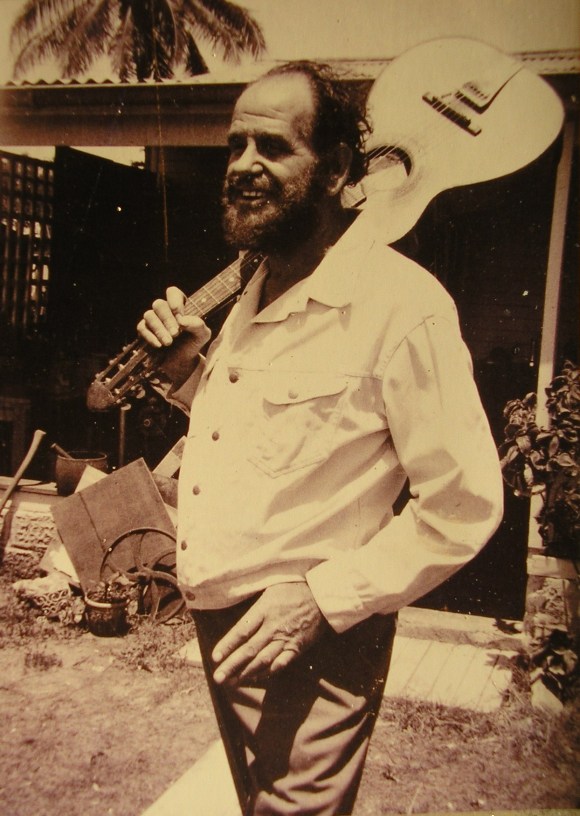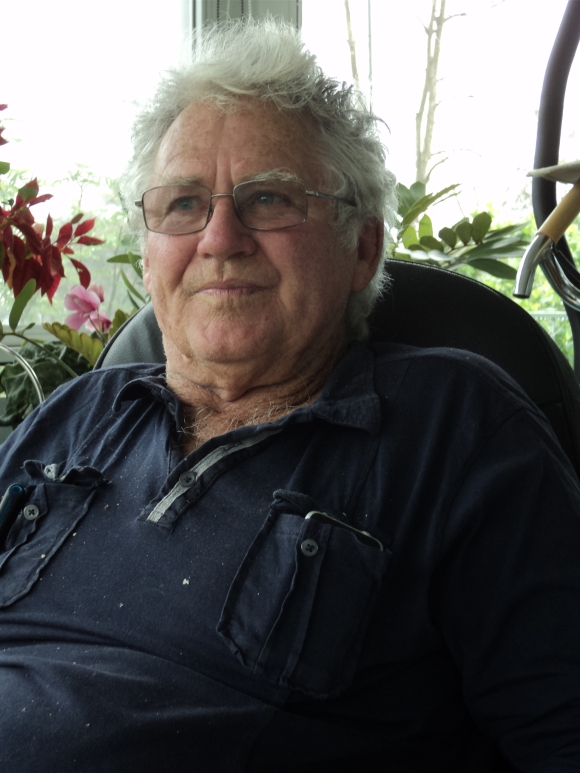The Wave Hill Puzzle: Missing Piece Found in Kenya, via Hampshire, in a Moving Car
A side-effect of my obsession with the ex-Welfare Settlement at Wave Hill (Kalkaringi) is that I have almost completed a temporal jigsaw. Since the Wave Hill Ration Depot was established in the late 1950s, job titles and descriptions have changed with policy eras, but there is a simple constant belying constant flux: the settler society (and the Gurindji, in recent decades) have maintained a non-Indigenous overseer onsite, year in and year out, for five decades. (Prior to that, a lone policeman worked their own pared-down agenda). The ‘jigsaw’ I’ve completed is an inventory of these gentlemen in the period 1966–1986. I have either interviewed these men, or their widows, or have gleaned biographical info to complement the archival record of their work.
(The following paragraph is a historical description of the mutable policy rhetoric and conceptualisation of these roles. Please skip it, if so inclined, and move to the next paragraph).
In the Welfare Branch days, these men were employed by the federal government to ‘manage’ or ‘supervise’ remote settlements. After Gough Whitlam was elected in 1972, such public servants were deployed in an ‘advisory’ capacity. Later in the 1970s, the Settlement’s Gurindji residents incorporated their own community council (under the Aboriginal Councils and Associations Act, 1976) and the name of the place changed to Kalkaringi. Whitlam’s Community Advisors were discarded, and replaced by a series of Town Clerks. Although the Town Clerks were in some regards the ‘managers’ of the Council (effectively a local government body), they were employed by their Aboriginal board. Their role however, was practically the same as their federal predecessors. In 2008 the NT ALP Government terminated this model with the amalgamation of such local councils. Live-in federal government representatives also returned under the terms of the Howard Government’s Intervention in 2007, but that’s a digression.
The first of these characters to cross my path was the one who employed me in 2004, a deeply humorous and effective Irishman called Sean Heffernan. The next I heard of, I have written about here — Welfare Branch Officer ‘Wild Bill’ Jeffrey, present during the Wave Hill Walk-off, 1966–67. More blank spaces in the puzzle slowly revealed their contents. After five years of research, I interviewed Ray Hempel and a gentleman once unfairly known as ‘Long Socks Lenny’, Settlement Managers at Wave Hill in 1971 and ’72 respectively. Then I learned that the long-term activist, Gurindji-familiar and bush community worker Stan Davey returned in the early 80s to help right the ship after the excesses of the previous decade. Over time, the gaps in the ‘puzzle’ became rarer than those that I’d filled.
Wild Bill Jeffrey, c.1967 (Image Courtesy of Robin Jeffrey).
During the throes of submitting my Masters’ Thesis, something of a coup occurred — using old Welfare Branch correspondence and the electoral rolls of 1969 and 2012, I located Tony Scott, an officer present at Wave Hill in the all-important year of 1969, when a biblical swarm of rodents threatened to eat the Settlement off the face of the earth and the federal government was tearing itself (and Tony, it turned out) in two over its ambivalence about the Gurindji and the bogey of Land Rights. Tony’s account of this time will feature in my book.
Former Welfare Officer Tony Scott, November 2012.
The discovery of A.A. Scott left one ‘piece’ of my 30-year managerial jigsaw missing: that of IC Rodger (1967–68), who was employed by Harry Giese to reassert strict control over the Settlement after the politically inflamed reign of Bill Jeffrey. My usual avenues of pursuit— the electoral roll and Google, on high rotation— got me nowhere with this chap, though I did enjoy a brief correspondence with an 85 year old namesake, who turned out to be a retired toy merchant.
When I went swimming a few days ago in the Murrumbidgee River with a recent acquaintance, things had gone pretty quiet on the Rodger trail. Simon, the husband of an old friend, was sympathetic to my interests, and began telling me as we drove home of a teacher he’d worked with briefly in England twenty years ago. He described a highly endearing, unassuming old coot with rip-roaring tales of adventure from Kenya and the Northern Territory of Australia. My interest was aroused, but when Simon mentioned his name, I was beside myself.
‘WHAT??’ I gasped, ‘Ian RODGER??’
Wave Hill, Kenya, Hampshire, the Murrumbidgee…. of course! I went back to the internet to mull on the puzzle further. Much to my disappointment, it emerged that Ian Crudgen Rodger passed away four years ago, in Kenya. Allegedly was buried in his sleeping bag with some wine and a tin of baked beans. I am hoping his wife is alive, and might tell me some detail of their torrid times at Wave Hill in the late 1960s, when the minions of Harry Giese watched her husband closely and the Gurindji and the Council of Aboriginal Rights brewed a post-colonial revolution on their doorstep at Wattie Creek.



The passing of Ian Rodger – hilarious! (in a dark kind of way)
Thanks Anonymous, if that’s not an ironic comment, I’ll take it as a compliment to my gonzo writing style, rather than a reflection on someone’s death. Peace.
Amazing!!! Keep up the sleuthing and interpreting. Hope to see you soon in Melbourne. Rob
Thanks Rob, and likewise, I’ll be in touch soon about our southern sojourn 🙂
…its true. Ian Cruden Roger was buried in his sleeping bag, with a tin of beans and some spam for good measure in Kongoni Sanctuary on the south side of Lake Naivasha, Kenya. An amazing guy -was very lucky to have met him
Thanks for dropping by and reading about your old mate, Tom. Good to have the baked beans story confirmed! You might have been part of the recent connection with Ian’s widow with mt NT friend KP?